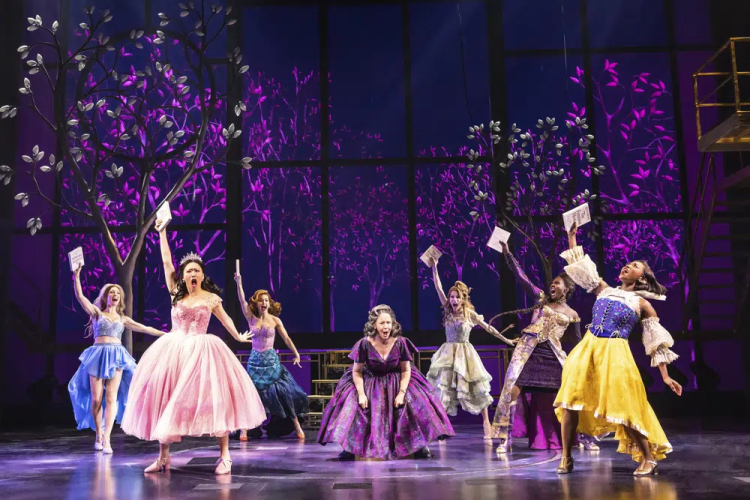In the Broadway musical “Once Upon a One More Time,” adorned with Britney Spears songs, audience members are given LED wristbands upon entry. However, these wristbands remain lifeless throughout the show, only illuminating at the curtain call. This seemingly insignificant gift symbolizes the ultimate freedom attained by the end of the performance, as it glows with the realization of being liberated from this bombastic, condescending, awkward, and uninspired production.
“Once Upon a One More Time,” premiered at the Marquis Theatre on Thursday, epitomizes the essence of mindless summer entertainment. It relies heavily on excessive smoke machines, peculiar dance interludes, copious amounts of glitter, and each song culminates in an artificially manufactured sonic climax akin to an IMAX spectacle. At one point, a character even swings from a chandelier.
The show’s entire premise feels recycled, presenting a fractured fairy tale concept that has become stale and overused. Even the esteemed Andrew Lloyd Webber’s recent attempt with “Bad Cinderella” fell short this spring. Additionally, the musical struggles with a paradoxical predicament: it strives to portray a safe feminist narrative about women taking control of their own stories, yet it is predominantly led by a creative team comprised of men. This highlights an ongoing issue on Broadway, which feels especially uncomfortable in a production centered around princesses seizing their narratives.
Penned by Jon Hartmere, the musical “Once Upon a One More Time” revolves around renowned fairy tale princesses such as Cinderella, Snow White, Rapunzel, and the Little Mermaid. In a manner reminiscent of their gathering in the movie “Ralph Breaks the Internet,” these iconic characters find themselves united. However, their lives take a transformative turn when they stumble upon “The Feminine Mystique,” a groundbreaking feminist work. Authored by Betty Friedan, this influential book played a significant role in sparking the women’s movement. It shed light on the societal constraints that treated women as captives within a culture that idealized motherhood and domestic duties.
The motives behind diminishing Betty Friedan’s significance in the musical and the decision of a post-conservatorship Britney Spears to authorize this overt production remain unclear. The show incorporates several of Spears’ popular hits, including “Oops!… I Did It Again,” “Lucky,” “Stronger,” and “Toxic.” However, the creators have diluted the original essence of these songs by forcing them into a narrative they are ill-fitted for. Furthermore, the script attempts to blend inappropriate elements such as a threesome joke, intoxicated princesses, and references to Howard Stern with lines like “You’re not pulling my slipper?” This mishmash of elements appears disjointed and fails to effectively convey a cohesive and suitable storyline.
Adam Godley delivers a delightful performance as the droll and fastidious Narrator in the musical. Serving as the mastermind behind the fairy tales, he orchestrates the actions of the princesses, barking orders like “Ready the wedding scene!” and obstructing any potential change or growth. Cinderella questions if this is the “happy ever after,” to which he replies affirmatively. However, the reality proves otherwise.
The direction and choreography are helmed by Keone and Mari Madrid, a talented husband-and-wife duo known for their viral dance videos on YouTube. However, their choices in this production, particularly the odd and jerky arm movements reminiscent of a seizure, come across as peculiar. They excessively rely on exaggerated index finger pointing in “One More Time.”
Despite the show’s flaws, the two leads, Briga Heelan as Cinderella and former “American Idol” contestant Justin Guarini as Prince Charming, give commendable performances. They utilize their vocal prowess, physical comedy skills, and tenderness to elevate a script that falls short of their abilities, embodying true fairy tale heroism.
The story itself oscillates between flippant satire and saccharine sentimentality, attempting to establish a sisterhood bond without earning it. Additionally, an inclusion of a gay rights storyline feels forced and distracts from the overall narrative. Act 2 undergoes a drastic shift, transforming the Narrator into a monstrous villain akin to the villains in the Marvel Cinematic Universe, resorting to murder to maintain control. The desperate endeavor to create a coherent happy ending ultimately falls flat.
Undeniably, this is Britney Spears’ moment on Broadway, as many of her hits are also featured in “& Juliet,” another jukebox musical currently running on Broadway, which celebrates her collaborator and producer Max Martin. This production includes songs like “… Baby One More Time” and “Stronger.” In comparison, “Once Upon a One More Time” pales in comparison. It’s evident that this musical is primarily designed to attract pre-teen audiences and sell merchandise. Only one Spears-themed show on Broadway truly embodies the notion of being “Toxic.”








